Finding Peace of Mind: The Top 8 Most Powerful Natural Remedies for Alleviating Migraine Headaches
BY SIDNEY KURN, M.D., & SHERYL SHOOK, Ph.D., L.S.P.
 there are many powerful, effective natural remedies for migraines that can help the holistically minded avoid medication and actually work to heal and reduce pain and intensity.
there are many powerful, effective natural remedies for migraines that can help the holistically minded avoid medication and actually work to heal and reduce pain and intensity.
Migraine generally is an episodic headache that can be disabling. The word migraine is a French version of the Latin word hemicrania, meaning “half of the skull.” This refers to the tendency for migraine to affect one half of the head during an attack. It is estimated that twenty-eight million Americans are in need of natural remedies for migraines with 18.2 percent of females and 6.5 percent of males having at least one migraine attack per year.
53 percent of migraineurs (individuals suffering from migraine) report severe disability or the need for bedrest during an attack, so home remedies for migraines are essential to dependable treatment. The headache occurs unilaterally 60–70 percent of the time and the pain is described as throbbing or pulsing with a tendency to become a continuous ache.Based on our research, the following nutrients and herbs are recommended as natural migraine remedies. As with all other maladies, every migraineur is different and requires individualized therapy. In particular, transformed migraine, the transformation of periodic migraine attacks to daily headaches, usually in the presence of excessive over-the-counter medications, requires very careful monitoring. Medical supervision is recommended. Scientific studies demonstrate metabolic changes in transformed migraine that are not present in nontransformed migraine.
1. Magnesium
It has been known for some time that individuals with migraine have reduced levels of magnesium, both in the serum and intracellularly. Up to 50 percent of patients have decreased magnesium during an acute attack. In addition, an intravenous infusion of magnesium can abort an acute attack and daily oral supplementation with magnesium can reduce the frequency of migraine attacks. Magnesium as a home remedy for migraines reduces the symptoms in several ways. It plays a significant role in inhibiting the flow of calcium into cells at an ion channel activated by glutamate. Glutamate acts on a specific receptor, the N-methyl d-aspartate (NMDA) receptor. When activated, the channel opens for several ions, potassium, sodium, and calcium. The influx of calcium and other ions may result in the release of more glutamate as well as substance P, a signaling molecule for pain. The magnesium ion blocks this channel outside the cell and needs to be expelled before it will open. Magnesium deficiency may disinhibit the NMDA receptor.
Magnesium as a home remedy for migraines is essential with doses from 200 mg twice/day up to 400–500 mg twice/day depending upon GI tolerance.
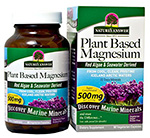 Conscious Lifestyle Recommends:
Conscious Lifestyle Recommends:
Nature’s Answer Plant Based Magnesium
Derived from Icelandic red marine algae and ultra-pure arctic seawater, this plant-based magnesium supplement is 100% natural and fully bioavailable. Virtually all other magnesium supplements are lab-created with synthetic materials that are not ideal for the body. This is 100% natural magnesium just like nature intended ideal as a home remedy for migraines.
2. Taurine
One of the pertinent natural home remedies for migraines is taurine’s effects on glutamate, GABA, and intracellular calcium. Taurine appears to inhibit glutamate’s effect of raising intracellular calcium. This was well established in studies at the University of Kansas in 2001. Subsequent work demonstrated a reduction in calcium influx through specific voltage-gated calcium channels and the NMDA receptor calcium channel. Magnesium appeared essential for the taurine effect.
The authors of the study conclude by saying, “We propose that taurine protects neurons against glutamate excitotoxicity by preventing glutamate-induced membrane depolarization, probably through its effect in opening chloride channels and, therefore, preventing the glutamate-induced increase in calcium influx and other downstream events.” This correlates with other studies demonstrating an agonist effect of taurine at GABA receptors, which are known to modulate the chloride channel, in short, natural migraine relief.Dosages of this natural remedy for migraines range from 500–4000 mg/day in two divided dosages. Magnesium taurate may be an efficient way of supplementing with both nutrients.
 Conscious Lifestyle Recommends:
Conscious Lifestyle Recommends:
Pure Encapsulations Taurine
Ultra-high quality and 100% pure, this high potency Taurine supplement is free from all synthetic fillers and binders and uses pharmaceutical grade Taurine for maximum potency and effectiveness in treating headaches and migraines.
3. CoQ10
By increasing CoQ10 levels, it may be possible to improve cellular energy levels thereby making the brain more resistant to the migraine process. Several positive studies have been performed. An open label trial conducted at Thomas Jefferson University in Philadelphia on thirty-two patients showed significant benefit of 150 mg/day for natural migraine relief. A subsequent randomized controlled study in Zurich used 300 mg/day on forty-two migraine patients. A 50 percent decrease in attack frequency occurred in 47.6 percent of patients receiving CoQ10 and only in 14.4 percent in the placebo group.
It is a very safe nutrient but high quality, high dosage CoQ10 can be expensive. Dosages of CoQ10 that are useful as a natural home remedy for migraines vary from 30 mg to several hundred mg/day. The standard riboflavin dosage is 400 mg/day.
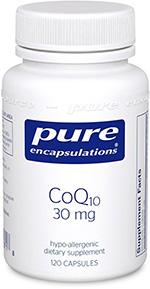 Conscious Lifestyle Recommends:
Conscious Lifestyle Recommends:
Pure Encapsulations CoQ10
Ultra-high quality and 100% pure, this high potency CoQ10 is free from all synthetic binders and fillers and delivers a pharmaceutical grade CoQ10 for maximum bioavailability, potency and effectiveness for natural migraine relief.
4. Acetyl-L-Carnitine
500 mg twice/day is another mitochondrial nutrient that may be helpful as one of the home remedies for migraines for, as is ALA 300 mg/day of a sustained-release form.
Where to get it: Now Acetyl-L-Carnitine
Sleep
Studies have shown a relationship between headaches and sleep deprivation in the presence and absence of sleep apnea. A 2002 review establishes that sleep deprivation brings on headaches in those with headache disorders and those without. In a more recent study, sleep deprivation is listed as one of the “principal precipitating factors” in migraine headaches. In the presence of obstructive sleep apnea, 80 percent of patients who treated their apnea were relieved of their headaches, making this one of the most potent home remedies for migraines.
Further research is needed to clarify possible sleep deprivation related-mechanisms that may underlie migraine. The reader is encouraged to examine sleep habits early on in their exploration of natural remedies for migraines and evaluate the potential for any sleep disorder.5. Feverfew
The traditional, primary natural home remedies for migraines are feverfew and butterbur. Feverfew, a name derived from the Latin word febrifuge, or fever reducing, has been part of the European herbal tradition for centuries. Used for fevers, arthritis, migraine headaches, and a number of other indications, feverfew has anti-inflammatory properties. An early study in 1982 demonstrated inhibition of platelet phospholipase by feverfew. The enzyme phospholipase releases arachidonic acid from membrane phospholipids resulting in pro-inflammatory prostaglandins. Feverfew’s inhibition of phospholipase results in reduced pro-inflammatory prostaglandins. Researchers from Yale reported on a study of parthenolide, a sesquiterpene lactone, the active ingredient of feverfew.
Dosage for natural migraine relief is 80–240 mg twice/day of a product standardized to 1.2 percent parthenolide content.
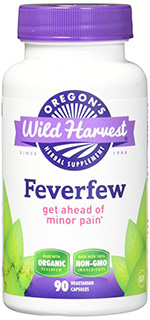 Conscious Lifestyle Recommends:
Conscious Lifestyle Recommends:
Oregon’s Wild Harvest Organic Feverfew Capsules
Oregon’s Wild Harvest offers a full spectrum organic Feverfew product that is freeze-dried for maximum freshness, potency and effectiveness as a natural home remedy for migraines. Sustainably grown in the Pacific Northwest in rich, organic soils with high nutrient density.
6. Butterbur
Another herb that has efficacy as a migraine home remedy is butterbur (Petasites hybridus). It is a perennial shrub that has been used for centuries for inflammatory disorders, including the plague, fever, cough, asthma, and skin wounds. Butterbur appears to have at least two anti-inflammatory mechanisms capable of natural migraine relief. It is a selective COX-2 inhibitor. COX-2 is the enzyme responsible for the formation of inflammatory prostaglandins.
As noted above, since nitric oxide may play a role in causing migraine headaches, downregulation of the gene responsible for the enzyme leading to its formation may be another pathway for the beneficial effect of butterbur as natural migraine relief. Finally, there are studies on another species of butterbur that demonstrate the inhibition of calcium channels.
At least three studies have demonstrated a prophylactic effect of butterbur in migraine headaches. All of these natural migraine treatment studies were randomized and placebo controlled, and one was double blind. The butterbur was well tolerated and all three studies show significant benefit of butterbur.
Dosage of this herbal remedy for migraines is 50–75 mg twice/day.
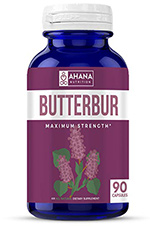 Conscious Lifestyle Recommends:
Conscious Lifestyle Recommends:
Ahana High Potency Butterbur Extract
Ahana offers a high-quality butterbur extract standardized to 15% petasins for maximum migraine and headache relief. Certified free of harmful pyrrolizidine alkaloids and delivered in an easily digestible vegetarian capsule.
7. Cannabinoids
The basic research reveals that cannabinoids can interrupt a number of the pathogenic mechanisms in migraine and be used as a home remedy for migraine headaches, as discussed above.
An article in the Journal of Cannabis Therapeutics by Ethan Russo discusses the extensive history of the usage of cannabis as a natural remedy for migraine headache relief. A number of ancient cultures including the Chinese, Indian, Egyptian, Assyrian, Greek, Roman, and the Islamic world used cannabis for both symptomatic and prophylactic use in migraine home remedies. Russo states, “the most prominent physicians of the age in the century between 1842 and 1942 preferred cannabis to other preparations in natural migraine treatment, and it remained part of western pharmacopoeias for this indication throughout the period.”
The following is a summary of some of the research findings that support the potential efficacy of cannabinoids as natural cures for migraines. An older study from 1985 reports on a statistically significant reduction of 14C-serotonin release from platelets when the patient’s plasma, obtained during an attack, was incubated with phytocannabinoids. The same effect was not seen when the plasma was obtained from the patient in a headache-free period of time. Plasma serotonin appears to play a significant role in acute migraine including vasoconstriction and stimulation of perivascular pain fibers.
If historical usage as a home remedy for migraines can be considered as part of evidence-based medicine, then there is a long history of efficacy of phytocannabinoids in migraine. Based on the basic research and historical clinical precedent, as well as the safety of use, it would appear appropriate to try cannabinoids for natural migraine relief.
If the patient finds that cannabinoids are ineffective to use at the onset of headache, or if the migraines and headaches are frequent, at least two times/month, the migraneur may want to consider daily oral dosing with a high CBD preparation as their migraine home remedy.
Dosage and form has to be individualized and the patient is well advised to seek the help from a medical practitioner experienced in the use of medical cannabis and other home remedies for migraine headaches. Starting with a high CBD:THC ratio preparation either at 2.5–5.0 mg at migraine onset or working up to 25–50 mg in two divided dosages/day for prophylaxis is certainly reasonable and safe, based on numerous other clinical studies where cannabis has been used for different disorders. Even higher daily divided dosages can be tried to find the therapeutic window for any individual’s natural migraine relief. Refer to the cannabinoid section of the “What These Six Disorders Have in Common” chapter of the book for important general dosing guidelines for cannabinoids.
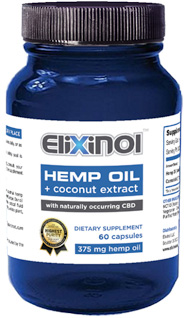 Conscious Lifestyle Recommends:
Conscious Lifestyle Recommends:
Elixinol Organic High Potency CBD Capsules
Elixinol offers a highly concentrated, high-potency, organic whole-hemp plant CBD oil , which is naturally extracted with carbon dioxide and free of all synthetics and chemicals. Whole-hemp plant extracts contain synergistic compounds that are believed to enhance the effectiveness and benefits of CBD.
8. Pyrroloquinoline quinone
PQQ should also be considered as a supplement for migraines. PQQ as a supplement is a relatively new application. This home remedy for migraines has antioxidant, anti-inflammatory, and neuroprotective properties, as well as displaying significant benefit in mitochondrial biogenesis.
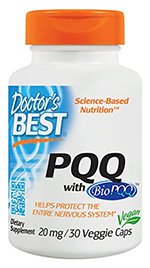 Conscious Lifestyle Recommends:
Conscious Lifestyle Recommends:
Doctor’s Best PQQ (Pyrroloquinoline quinone)
Ultra-high quality PQQ (Pyrroloquinoline quinone) in a special highly bioavailable form for maximum absorbability and effectiveness for treating migraines headaches naturally.
This article on natural home remedies for migraine headaches is excerpted from Herbs and Nutrients for Neurologic Disorders: Treatment Strategies for Alzheimer’s, Parkinson’s, Stroke, Multiple Sclerosis, Migraine, and Seizures by Sidney J. Kurn M.D. and Sheryl Shook Ph.D. Reprinted with permission from the publisher Inner Traditions International. InnerTraditions.com
About The Author
Sidney Kurn, M.D., graduated from University of California–Berkeley in math/physics. He became a clinical associate professor at University of California–San Francisco Medical Center, teaching residents at Community Hospital in Santa Rosa. With a quest for other treatment modalities for neurologic disorders, he learned acupuncture through the medical acupuncture UCLA program and herbal medicine from practitioners in Santa Rosa.
Sheryl Shook, Ph.D., L.S.P., graduated from California Polytechnic State University in San Luis Obispo with a bachelors in engineering before working as an engineer and scientist on the International Space Station Program. Thereafter, she attended University of California–Davis where she completed a doctorate in neuroscience. Her work with neurosurgery teams and a seizure unit compelled her to find more answers to healing neurologic disorders and thus completed studies in herbal medicine.








